Christie, Huckabee Relegated To Undercard In November 10th Republican Debate
The debate stages for both the undercard and main debate next Tuesday will look different from what we've become used to.
Fox Business Network has announced the lineup for the undercard and main stage debates next Tuesday, and there are some major changes that are likely to impact the fate of several candidates:
Chris Christie failed to make the cut for the main stage at the upcoming Fox Business Network/Wall Street Journal debate, a major blow for the New Jersey governor who has struggled to gain traction in the presidential race.
Fox Business announced the lineup on Thursday for its 9 p.m. main event and 6 p.m. undercard debate on Nov. 10. Christie failed to meet the 2.5 percent average polling threshold needed to make the primetime event, after having been on the main stage for the prior three GOP debates.
Sen. Lindsey Graham, former New York Gov. George Pataki and former Virginia Gov. Jim Gilmore also got bad news, failing to register enough in the polls to participate in the event at all. Former Gov. Mike Huckabee also got bumped to the undercard stage.
That gives us a main stage debate consisting of Donald Trump, Ben Carson, Marco Rubio, Ted Cruz, Jeb Bush, Carly Fiorina, John Kasich and Rand Paul. The undercard debate will consist of Huckabee, Christie, Bobby Jindal and Rick Santorum. I noted earlier today that Christie probably wouldn’t make the cut for the main stage, but Huckabee’s failure to make the stage depended on which of the five most recent polls Fox used to determine eligibility. Obviously, he didn’t fare well in their selection. As for the undercard debate, Pataki, Graham, and Gilmore failed to make the cut because they failed to register even one percent support in any of those polls.
As I’ve said since the CNBC debate, the best way to improve the overall quality of the debate was to reduce the number of participants, so reducing the main stage to eight candidates should actually allow the reporters to get detailed responses from the candidates, assuming they’ve learned something from the horrible time management that the CNBC moderators did which made that debate an overall disaster. The undercard debate will likely get more attention than it has in the past because of the presence of Huckabee and Christie this time around, but in all honesty the fact that they have fallen into the same tier as candidates who barely register in the polls can only be bad news for their respective campaigns notwithstanding whatever effort they make to try to spin it any other way. The same can be said for Graham and Pataki, both of whom had been part of each of the three previous undercard debates. In the end, though, those debates have become less and less relevant since the first debate on Fox News debate in August and it seems hardly relevant whether they would be there or not.
No doubt, we’ll hear some complaining from the candidates who have been relegated or denied invitations about the “fairness” of the process, but it strikes me that the process has been exceedingly fair. The participants in the undercard debates have been given three months, and most of them given three opportunities for free air time, and if they can’t even register one percent in the polls at this point then it hardly makes sense to pay their campaigns serious attention. Similarly with Christie and Huckabee, the fact of the matter is that both of these candidates have only seen their numbers decline since the debate process started. They have also both posted less than impressive fundraising numbers. If they can’t average 2.5% in the national polls at this point in the race, then they don’t belong on the main stage with people polling twice as high as they are and more. Perhaps either Huckabee or Christie will turn their numbers around and get back on the stage for the debate in December or January, perhaps not. That’s not really something that either the debate sponsor or anyone else should worry about.
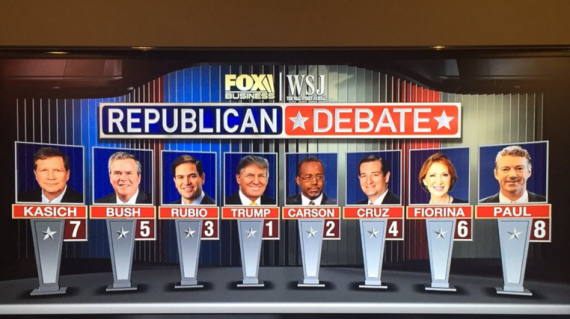

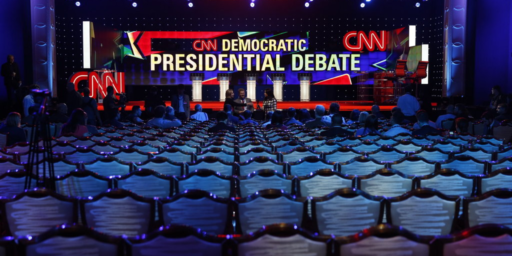
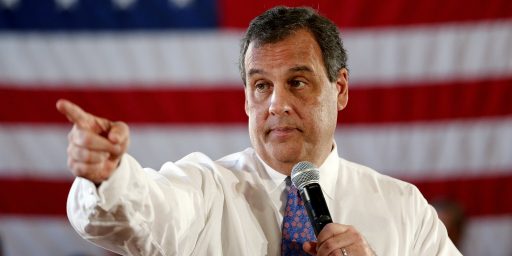
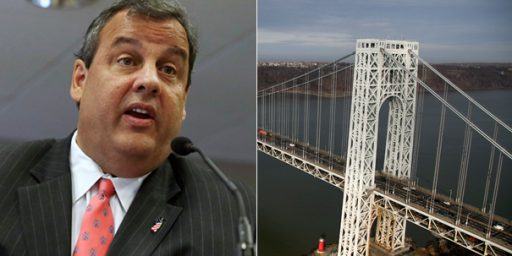
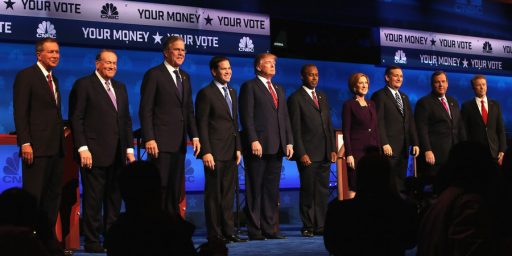
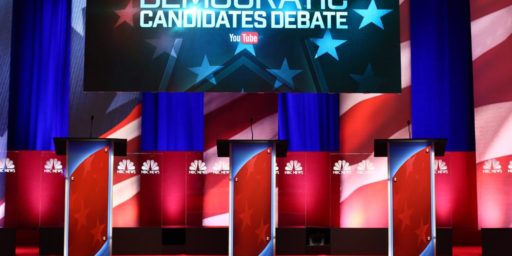
Bush and Rubio, side by side, but what do we really want? Cage match! Cage match!
I think Fox Biz could stand to cut John Kasich and Rand Paul as well.
I’m not sure why they still have a “kiddie” debate. The 4 people there have been out of the running for months.
I’m not sure why they still have a “kiddie” debate. The 4 people there have been out of the running for months.
@JWH: I’d throw in Fiorina.. 5 is a good number..
What would really help the debates is candidates that don’t talk nonsense, but…
Detailed responses? From these clowns?
They have 2 economic policies: Cut taxes, end regulation.
They have 1 foreign policy: War. (or threatening it)
They have 1 domestic policy: Whatever the Christians want.
Everything else is just window dressing.
Agree with Doug on this. I would go further a and limit the major debate to top 5, and undercard to the next 5 , and then after this debate, have only a top 5 debate. At this point, everybody has been introduced, and the people who are interested in politics have made their decisions. There are candidates they want to hear from, and there are candidates they’re not interested in. It’s time to move the candidates they’re not interested in off the stage.
It is pretty near impossible to disagree with the selection of candidates for free media time based on national polling numbers. It does indeed make sense in our present nationalized marketing and digitally linked world. And it has been known for decades now that candidates and platforms are in fact merely products, elections are merely markets and voters merely customers.
It should be worth a glance at the rear-view mirror that our state-by-state system of electing national leaders is becoming more and more archaic. This has implications for the direction of future — ahem — ‘reforms’ such as national popular vote schemes that would replace the Electoral College (for one).
As someone who is temperamentally a conservative (abducted by reality to a left-liberal stance) I hate to see the future rushing in without politely escorting our past to the exit. I just hope to have our heritage sign the guest book on the way out the door.
I’m with taking the main event down to 6 maybe 5. I don’t see the point of keeping Paul and Kasich in the main debate and Fiorina is pretty close there as well (I think she’s more likely to make the short list for VP or a cabinet post than win the primary).
IMO Fiorina has had her peak and Jeb as well. Trump, Rubio, Carson and Cruz seem to be the main likely to stick it out for a while candidates although I think Carson falters first and it narrows to three.